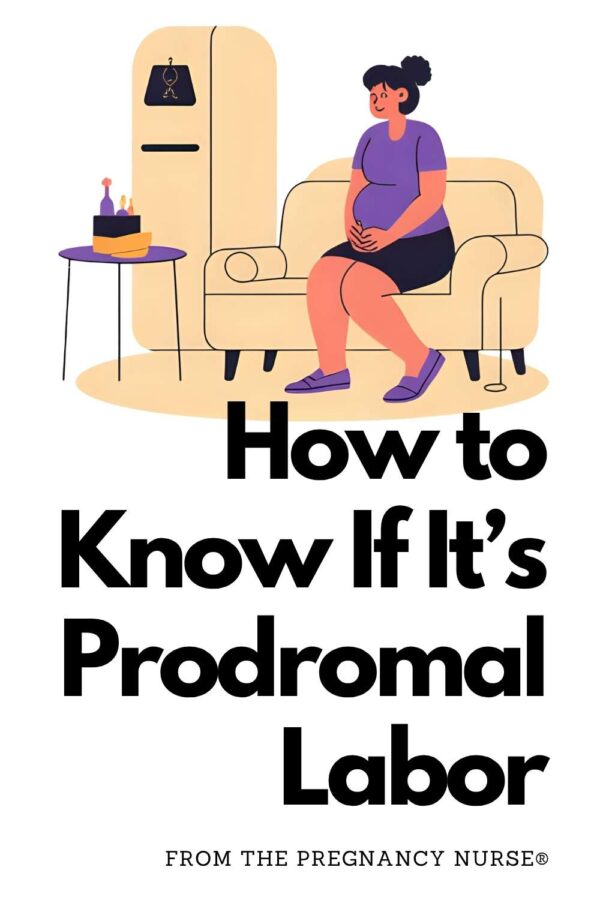📣 YOU are clearly getting prepared for pregnancy, birth & beyond — but do you wish your partner was more involved (looking for a teammate rather than just a cheerleader)? Couples love THIS! 💛🧡💚
What is prodromal labor, how do you avoid it and what to expect in early labor at home. I think early labor is a part that a LOT of people over-think and possibly ruin — so I’m excited that you’re here to talk about prodromal (or early) labor.

Before we get started, prodromal labor is definitely a great time to pack those bags. Grab my hospital packing list here:
We’re only talking about TERM labor (after 36-37 weeks). Anything prior to that is PRETERM labor, and even if it’s “prodromal” we don’t want it to progress so please contact your provider or head into the hospital if you’re experiencing labor signs. There are things we can give you to stop it to allow baby to develop more in the womb!
What is Prodromal Labor?
I see a lot of people saying that it’s “false labor” — and while I wouldn’t really categorize it as “true” labor it isn’t to say that our contractions aren’t doing anything.
Sometimes they are — and we’re going to talk about that next — but usually prodromal labor is when your contractions get going for a bit and then either space out or peter out and go away.
It. is. wildly. annoying.
I get it, it feels like our body is attacking us, and I think prodromal labor is a reason a lot of people ultimately ask to get induced because it just feels like false start, after false start.
But, what if I was here to tell you that’s just the last few weeks of pregnancy?
You’re likely going to have a LOT of false starts. Maybe prodromal labor is just part of the fun. Maybe we ride the waves, and don’t really think anything til’ the contractions progress.
Remember, heading into true labor you’ll see:
- Stronger (more painful)
- Closer together
- Most often lasting longer.
Often those prodromal labor contractions don’t last a full minute — and they’ll slowly get closer to 60 seconds.
I know that is easier said than done, but I see so many people trying to PUSH their body into labor online doing fruitless, and often painful, things to push themselves into labor.
Wishing those things worked — check out these posts (and the studies that debunk them):
- When Should I Start Drinking Raspberry Leaf Tea?
- What is Stripping Membranes? (Membrane Sweep)
- Sleeping Positions to Induce Labor: Best Positions to Dilate
- Why Does Eggplant Induce Labor?
What about those contractions that do nothing?
So, when you’re dehydrated your uterus is “irritable” meaning it’s just sort of cranky. Most people just feel cramping and kind of gross.
But, dehydration is definitely a part of what people call prodromal labor… which begs the question…
Can You Avoid prodromal labor?
The main thing is to make sure you’re drinking enough water. I tried to do that mostly before dinner so I wasn’t peeing all night.
However, a BIG time for prodromal labor is that bedtime hours. SO often people will have contractions, likely after a long day of hauling their body around and not being as kind to ourselves as we should (definitely guilty of that here).
That happened to me, so I’d drink a big glass of water just to make sure that wasn’t the culprit (because even if I was peeing, at least I wasn’t in fruitless pain, peeing).
I would often have patients feel like if they didn’t drink water it could push them into labor — but instead you’re just making that uterus (and likely you) more irritable — so make sure you stay hydrated.
Another tip — while not exactly avoiding it is to just sort of ignore it.
You can treat the “symptoms” aka —
- Take a warm bath (or shower) to help you relax
- Use a heating pad if it hurts somewhere in particular (just not over your belly)
- Do some light stretching to help those tight hips
But the more we play into “is this it?” the worse it ends up being for us.
My tip is to ignore it as long as you can…. and once you can’t really ignore it, maybe it is it!
What to do in early labor to help labor progress?
Besides ignoring it, and treating the symptoms is what I ALWAYS call-in the first line of defense…
A lot of people love the miles circuit. However, there is no evidence on it (or, frankly studies) and if you’re hating some of the positions I 100% tell you to stop. But, some of them might feel good, and I think movement is always a good thing, if it’s feeling good.
I’ve heard a lot of anecdotal evidence about curb walking as well — especially in early labor.
My tip — get on a phone call with a good friend, and do 30 minutes of it, making sure to switch sides every 5 minutes or so. BUT, if it’s really hurting, stop.
Remember, going into “true” labor there has to be an agreement between:
- The baby — it’s developed enough to come
- Your brain — you’re in a safe space to let this happen
- Your uterus — it’s time to get that baby OUT
Of course, this system doesn’t always work perfectly (looking at you preterm labor) but that’s the basic idea of thought.
Want to know more labor tips — check out these posts:
- Avoid Tearing at Delivery: 3 things you can do.
- Why Labor Pain Can Feel So Different For Each Person
- 5 Simple Tips for a “Natural” Labor & Delivery
- Mistakes You’re Making That Makes Labor Longer
- Is an Induction More Painful than “Regular Labor”
Anything else you can do?
Studies don’t show a single thing will kick you into labor ASAP…. but there are things you can be doing in your last month of pregnancy to prepare your cervix. I have a whole post about it, including more info on the studies behind all four things:
In case you’re just curious, but don’t want to really click through the 4 things are:
Again, the idea is to start these things a few weeks before your due date — with the consent of your doctor. Some of those things are NOT good for everyone, especially anyone with mental health concerns or platelet issues needs to be careful with primrose oil. Be sure to talk with your provider before starting them (can I say that enough?).
Plus, I’m pretty sure I wouldn’t do all of them. Pick and choose which ones seems appealing or doable in your already busy and very tiring life during that last month of pregnancy.
Hey, if you’re in your 3rd trimester don’t miss my prep pack:
What to do in early labor?
It’s a great question, and one that I see a lot of people get wrong.
Let’s start off with what NOT to do:
- Obsessively time the cramps (especially if they’re not painful enough to take your breath away)
- Call everyone you know and say you’re in labor.
- Lay in bed in one spot just feeling miserable
Honestly, there is an art to early labor at home. I think it’s one of the most important thing to set your hospital birth up for success — because, as an L&D RN I firmly believe that the BEST place for you to be in early labor is at home — not the hospital. It allows you to stay comfortable, and likely progress with less issues due to that comfort.
I have a whole chapter on those early contractions, and what to do at home (and what partners can do to help) in here. I can’t recommend it enough, you need that lessons, along with the rest to really have an amazing birth.
Even if you think you’re in early labor it’s not too late for that class. Because it’s only 3 hours you really do have time to get started — great news, right!
However, since you’re here — let me give you 3 things to do:
Rest: So many people are busy doing that miles circuit and getting miserable they ignore the fact that rest is such a benefit as your body is heading into an important job. I can promise you that true rest isn’t going to stop your body going into labor (I’m talking about sleeping — not laying their “resting your eyes” — like my mom used to do).
Eat: I’m not talking a full steak, I’m saying every couple of hours fuel your body with a snack that includes both carbs and protein. I have a whole nutrition bonus video in here that helps with that too.
Move: When you’re not actually sleeping move your body. Now, that can be turning side to side if you’re feeling miserable, or it can be getting on all 4’s and cleaning your shower depending on your energy level.
One of the best things partners can do in early labor is to get those snacks already and help you move every 30 minutes or so (and help you clean that shower if you’re trying that). Partner tips are in there too!
My three other tips:
- Don’t get frustrated with yourself, it will come — patience is hard, but a real need here.
- If you’re just miserable and want labor to come, talk with your provider about an induction (if you’re past 39 weeks) — I’m glad we have that choice
- Be kind to yourself. This is confusing and miserable and you deserve credit for moving through it.
The good news is that baby should be here soon!
I want you to have the best birth you can hope for — come join me in The Online Prenatal Class for Couples where we prep you for your upcoming hospital birth (plus laboring at home, and managing life postpartum) in just a few hours. It truly is the EASY way to do it!
What are you going to try in this article? Let me know in the comments!







 How To Build Confidence For Your Birth Experience
How To Build Confidence For Your Birth Experience
